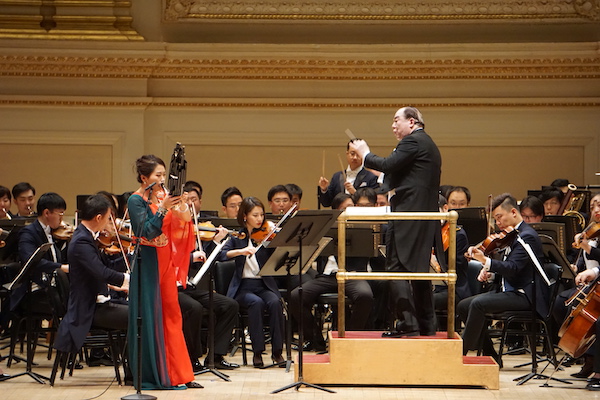Central Conservatory Orchestra provides a sampler of Chinese music in U.S. debut

Beijing is a city of music, but not the way you might think.
On a visit a decade ago one encountered live music everywhere: a woman playing a moon guitar in a public park pavilion; a karaoke singer in the shadow of the Temple of Heaven; a trio of street musicians performing on an erhu, pipa, and small keyboard.
Dancing, performing, singing with abandon abound, but there is also a more reflective side to Chinese music, not surprising in a country that reportedly has 40 million piano students.
While interest in all things Chinese has blossomed in the West in recent years, the vast nation’s classical heritage, innovations, and contributions to world art music are less known as they should be. Other than Yong Yao’s Yellow River Suite from the ‘80s and a few crossover tunes from Yo-Yo Ma and the Silk Road Ensemble, the indigenous classical music life of China still remains largely unexplored and misunderstood.
The U.S debut of a major Chinese orchestra Friday night at Carnegie Hall surely helped to provide some illumination with a generous sampler of current music being written in China.
Feng Yu, considered one of China’s leading conductors, led the 70-member Central Conservatory of Music Symphony Orchestra of Beijing in an evening of robust music-making, which included eight works by Chinese composers and six U.S. premieres. The long program, presented by MidAmerica Productions to kick off its 37th annual concert season, opened eyes and ears to a vital new world of Chinese composition and performance.
The compositions explored a wide range of musical sensibilities, from the tender lyricism of Xiaogang Ye’s The Backyard of the Village to the harsh, driven discords of composer Wenchen Qin’s The Cloud River, Concerto for Sheng and Orchestra (heard in its U.S. premiere).
The sound of this orchestra is full, assertive, and responsive to the very different characteristics and visions of the eight works.
Yu selected what may have been the most interesting and accessible work to open the program, Guoping Jia’s Ling Lai–Listen to the Sounds of Nature Not surprisingly, the theme of nature was strong throughout the program, which could have been marketed as a concert to raise awareness of the environment. Jia’s extraordinary ear has produced a wonder-filled work of program music developing from a first faint whisper of bells and harp through the swelling of forest sounds—different types of birds, crickets, peepers, swarming bees—to the sunrise towering over a landscape almost crazed with energetic humming, whirring, chattering sounds.
Although women composers may have been absent on this 2-1/2-hour program, they achieved featured status as the evening’s performing soloists.
Yang Zheng, attired in a striking floor-length ensemble of fluttering red and green fabrics, holds a master’s degree in an instrument many Western listeners have never heard: the sheng. This is a hand-held, vertical reed instrument with a mouthpiece creating an impressive array of tones and effects, sounding like a mashup of a harmonica, portative organ, and Indian harmonium. There was something wild and strange about the sound that is yet very appealing. Qin’s sheng concerto is dramatic, sometimes violent as the listener imagines fast-moving clouds speeding over a storm-swept river, but always intriguing.
Other soloists were Jingli Zhang, who migrated seamlessly between drum set and marimba, in Jianping Tang’s Cang Cai for Marimba and Orchestra (U.S. premiere) and Linfeng Fan on bamboo flutes in Wenjing Guo’s three-movement Sorrowful, Desolate Mountain for Bamboo Flutes and Orchestra.
Qiang Zhang gave a virtuosic performance in Danbu Chen’s Sleeve Dagger and Warriors, a work as fierce as its title. He played the pipa, a lute-like instrument which has a flat, thin body rather than a rounded, gourd-like shape. The sound of the plucked or strummed strings may lack the resonance of a lute or guitar, but has an urgent scampering quality, like raindrops tapping on a tin roof.
In another U.S. premiere, Ya Dai played soprano and alto bamboo flutes in Weiya Hao’s The Dream of Peony Pavilion. Inspired by the famous late 16th century play about two lovers, this performance stressed the melodic and almost percussive qualities of these flutes. performed with more of the elusive breathiness associated with classical bamboo flute playing.
Several of the works were somewhat unvaried in their aggressive drive, dynamic intensity, and discord. But these were balanced by the softer selections such as the works by Jia and Ye.
In some cases, the discord was indispensable such as in Ping Chang’s Black Light, an impression of the creation of the world as recounted in Genesis.
Posted Dec 17, 2019 at 8:40 pm by TMcNichol
This is a most sensitive response by the reviewer to the far-reaching range of the sounds of nature interpreted through western classical instruments blended with Chinese traditional instruments as the pipa, sheng and bamboo flutes.
The sheng concerto brought to mind the pre-Tang multi-faceted artist Gu Kaizhi’s poem that recounts how the skies burst forth in thunderous noise and fierce lightening in a grand crescendo and almost as swiftly retreats into silence like a scroll painting being rolled up and put back away. Guoping Jia’s Ling Lai-Listen to the Sounds of Nature–was so intimate it felt as if it was directed to the listener as if an audience of one.